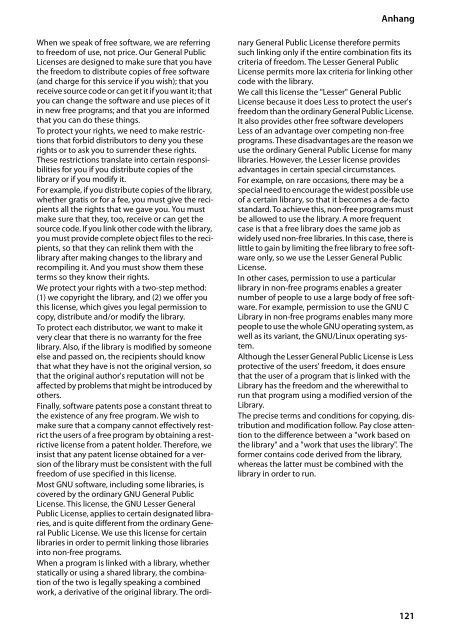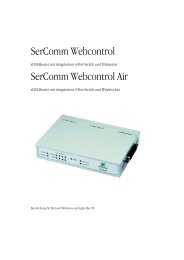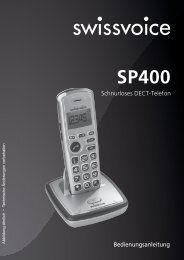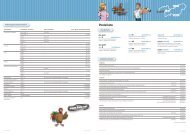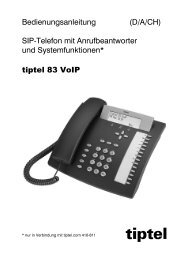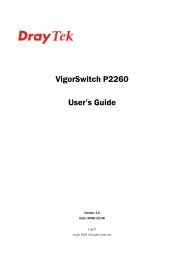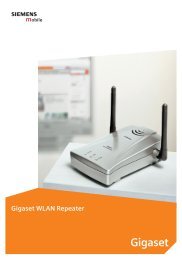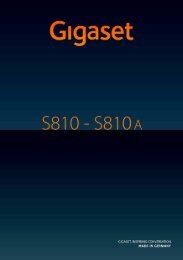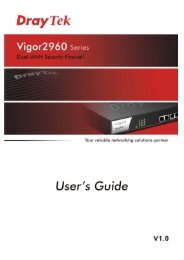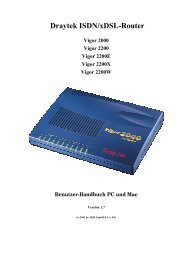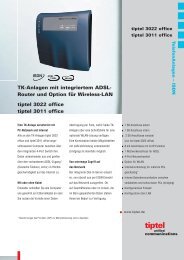Gigaset DL500A - TKR
Gigaset DL500A - TKR
Gigaset DL500A - TKR
Sie wollen auch ein ePaper? Erhöhen Sie die Reichweite Ihrer Titel.
YUMPU macht aus Druck-PDFs automatisch weboptimierte ePaper, die Google liebt.
When we speak of free software, we are referring<br />
to freedom of use, not price. Our General Public<br />
Licenses are designed to make sure that you have<br />
the freedom to distribute copies of free software<br />
(and charge for this service if you wish); that you<br />
receive source code or can get it if you want it; that<br />
you can change the software and use pieces of it<br />
in new free programs; and that you are informed<br />
that you can do these things.<br />
To protect your rights, we need to make restrictions<br />
that forbid distributors to deny you these<br />
rights or to ask you to surrender these rights.<br />
These restrictions translate into certain responsibilities<br />
for you if you distribute copies of the<br />
library or if you modify it.<br />
For example, if you distribute copies of the library,<br />
whether gratis or for a fee, you must give the recipients<br />
all the rights that we gave you. You must<br />
make sure that they, too, receive or can get the<br />
source code. If you link other code with the library,<br />
you must provide complete object files to the recipients,<br />
so that they can relink them with the<br />
library after making changes to the library and<br />
recompiling it. And you must show them these<br />
terms so they know their rights.<br />
We protect your rights with a two-step method:<br />
(1) we copyright the library, and (2) we offer you<br />
this license, which gives you legal permission to<br />
copy, distribute and/or modify the library.<br />
To protect each distributor, we want to make it<br />
very clear that there is no warranty for the free<br />
library. Also, if the library is modified by someone<br />
else and passed on, the recipients should know<br />
that what they have is not the original version, so<br />
that the original author's reputation will not be<br />
affected by problems that might be introduced by<br />
others.<br />
Finally, software patents pose a constant threat to<br />
the existence of any free program. We wish to<br />
make sure that a company cannot effectively restrict<br />
the users of a free program by obtaining a restrictive<br />
license from a patent holder. Therefore, we<br />
insist that any patent license obtained for a version<br />
of the library must be consistent with the full<br />
freedom of use specified in this license.<br />
Most GNU software, including some libraries, is<br />
covered by the ordinary GNU General Public<br />
License. This license, the GNU Lesser General<br />
Public License, applies to certain designated libraries,<br />
and is quite different from the ordinary General<br />
Public License. We use this license for certain<br />
libraries in order to permit linking those libraries<br />
into non-free programs.<br />
When a program is linked with a library, whether<br />
statically or using a shared library, the combination<br />
of the two is legally speaking a combined<br />
work, a derivative of the original library. The ordi-<br />
Anhang<br />
nary General Public License therefore permits<br />
such linking only if the entire combination fits its<br />
criteria of freedom. The Lesser General Public<br />
License permits more lax criteria for linking other<br />
code with the library.<br />
We call this license the "Lesser" General Public<br />
License because it does Less to protect the user's<br />
freedom than the ordinary General Public License.<br />
It also provides other free software developers<br />
Less of an advantage over competing non-free<br />
programs. These disadvantages are the reason we<br />
use the ordinary General Public License for many<br />
libraries. However, the Lesser license provides<br />
advantages in certain special circumstances.<br />
For example, on rare occasions, there may be a<br />
special need to encourage the widest possible use<br />
of a certain library, so that it becomes a de-facto<br />
standard. To achieve this, non-free programs must<br />
be allowed to use the library. A more frequent<br />
case is that a free library does the same job as<br />
widely used non-free libraries. In this case, there is<br />
little to gain by limiting the free library to free software<br />
only, so we use the Lesser General Public<br />
License.<br />
In other cases, permission to use a particular<br />
library in non-free programs enables a greater<br />
number of people to use a large body of free software.<br />
For example, permission to use the GNU C<br />
Library in non-free programs enables many more<br />
people to use the whole GNU operating system, as<br />
well as its variant, the GNU/Linux operating system.<br />
Although the Lesser General Public License is Less<br />
protective of the users' freedom, it does ensure<br />
that the user of a program that is linked with the<br />
Library has the freedom and the wherewithal to<br />
run that program using a modified version of the<br />
Library.<br />
The precise terms and conditions for copying, distribution<br />
and modification follow. Pay close attention<br />
to the difference between a "work based on<br />
the library" and a "work that uses the library". The<br />
former contains code derived from the library,<br />
whereas the latter must be combined with the<br />
library in order to run.<br />
121


